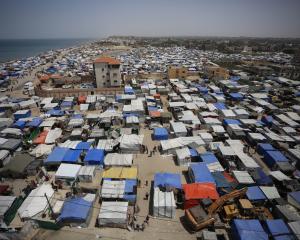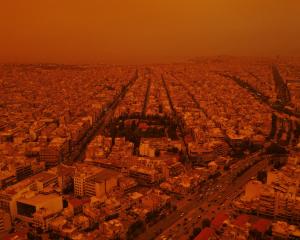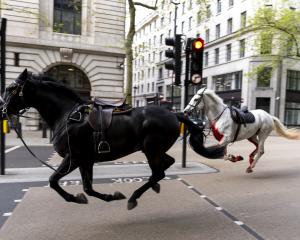The appeal came as African leaders met in Ivory Coast where they are expected to agree details of a regional mission that is due to take over from French forces but is short on financing, planning and even ammunition.
France has deployed ground troops and its war planes have bombed rebel columns and bases, halting an Islamist advance. The intervention aims to stop militants from tightening their grip on Mali's northern desert zone and using it as a springboard for attacks in Africa and on the West.
But Human Rights Watch said on Saturday that since France launched it strikes the group had received reports of serious abuses, including killings, being committed by Malian security forces against civilians around the central town of Niono.
"We urge the Malian authorities, as well as the French and (West African) soldiers/authorities to do their utmost to ensure the protection of all civilians," the New York-based organisation said in a statement. Malian officials were not immediately available for comment.
The stakes rose dramatically this week when Islamist gunmen cited the French intervention as a pretext to attack a desert gas plant in neighbouring Algeria and seize hostages. Algeria's army carried out a "final assault" on Saturday, killing 11 of the militants after they took the lives of seven foreign hostages.
The Sahara crisis has forced African nations to accelerate their own planned mission to Mali, which was originally not expected before September.
French Foreign Minister Laurent Fabius said French troops were not intended to replace the African operation.
"We must, as quickly as possible, furnish the logistical and financial means required by the Malian army and (the African mission)," he said, calling on donors to make commitments at a Jan. 29 conference in Ethiopia.
Mali's north has been occupied by a mix of gunmen since rebels bolstered with weapons seized from Libya after the 2011 fall of Muammar Gaddafi took up arms last year.
Separatist rebels who launched the fighting were soon sidelined by the Islamist alliance of al Qaeda's North African wing AQIM and home-grown Malian groups Ansar Dine and MUJWA.
Heads of state are expected to formally confirm pledges to dispatch some 5,000 African soldiers to join French forces.
"We must intervene because no economic revival, no region in the world will be safe if the Sahel goes over to the wrong side," said Ivory Coast President Alassane Ouattara.
Nigeria and Togo have already started their deployments, with Niger, Burkina Faso and Chad expected soon. But a Western diplomat said plans for the mission were "fluid".
"The troops are meant to go with 10-day self-sufficiency. But there's nothing in place to say what happens after," the diplomat said. "Who's going to pay for this, and what mechanisms are going to pay for it? The money is a big question."
WAITING FOR AMMUNITION
Underscoring the scale of the challenge, two other diplomats said Senegal's deployment was being held up by the lack of ammunition for their artillery. "They are waiting for it to be delivered," said one.
The bombing of a rebel column by French war planes and helicopters has halted an advance towards the central towns of Mopti and Sevare. Air raids and the deployment of French ground troops have helped Mali's disorganised army fight back.
The town of Konna was seized back from the insurgents earlier this week, but there were conflicting reports on Saturday about the situation in another town, Diabaly.
Malian military sources said French and Malian forces had entered Diabaly after it was abandoned by the insurgents on Friday following a number of French air strikes.
"French and Malian forces are clearing the town, house by house, as the Islamists had sheltered in houses," one of the officers said.
However, French Defence Minister Jean-Yves Le Drian said there were no Malian or French soldiers in Diabaly, and dismissed media reports of hand-to-hand fighting there.
"I think someone's hallucinating," he told French state TV in an interview. "There has been no fighting on the ground in Diabaly. We have said it and are saying it daily."
PAUSE IN OPERATIONS
Seydou Traore, a local government official in nearby Niono, said troops had moved in to Diabaly after the Islamists left.
The Malian officer who spoke of a house-by-house mop-up after the exit by Islamist forces said that there would be a pause in operations as Malian and French forces awaited the deployment of the African regional mission.
"We are waiting for them to get here before we launch a bigger and wide-ranging offensive," he said.
Human Rights Watch said that Tuaregs and Arabs, ethnic groups most associated with the rebels, were being targeted by Malian forces following the Islamists' retreat.
Le Drian said France had 2,000 troops on the ground in Mali as of Saturday morning, and the total might eventually exceed 2,500. President Francois Hollande said France's military intervention would last as long as it takes to "vanquish terrorism" in the region.
"This is not about us conquering territory or boosting our influence, or serving some form of trade or economic interest. That era is over," Hollande said.
"However, France must come to help to a friend country, one of the poorest in the world, which has been a victim for too many months, not to say years, of an evermore dreadful form of terrorism."
Military experts say France and its African allies must now capitalise on a week of hard-hitting air strikes by preventing the insurgents from regrouping in the desert.
(Additional reporting by Tiemoko Diallo in Bamako, Brian Love in Paris and Bate Felix in Niono; Additional reporting and writing by David Lewis; Editing by Rosalind Russell)












